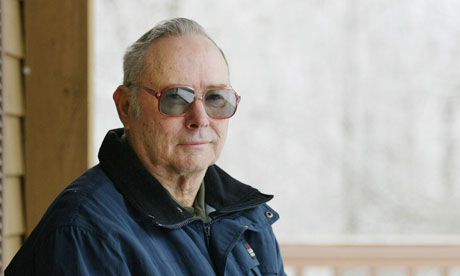
A man who donated a kidney to his dying twin brother 56 years ago in the world's first successful organ transplant has died in the United States.
Ronald Lee Herrick died, aged 79, on Monday in the Augusta Rehabilitation Centre, a hospital in Maine, New England, following complications from heart surgery in October, his widow, Cynthia, said.
Herrick donated a kidney to his identical twin, Richard, in a pioneering operation on 23 December 1954.
The successful surgery kept Herrick's brother alive for eight years and was the first successful organ transplant, according to the United Network for Organ Sharing. Lead surgeon Dr Joseph Murray went on to win the Nobel prize.
The operation proved that transplants were possible and led to thousands of other successful kidney transplants, and later the transplant of other organs.
Doctors around the world had tried a few transplants before the breakthrough operation, without success, said Murray, who went on to perform another 18 transplants between identical twins.
"This operation rejuvenated the whole field of transplantation," said Murray, 91, who lives in Wellesley, Massachusetts.
"There were other people studying transplants in four or five different countries, but the fact that it worked so well with the identical twins was a tremendous stimulus."
Herrick grew up on a farm in Rutland, Massachusetts, and later served in the US army.
He was 23 when he donated a kidney to his brother, who was dying from chronic nephritis, an inflammation of the kidneys. Murray thought the odds of a transplanted organ being accepted would be enhanced since they were identical twins.
Before the operation, many opposed the idea of transplanting an organ, equating it with desecration of a body. Others argued it was unethical to operate on healthy humans, and editors of medical journals wrote that it was contrary to the Hippocratic oath to never do harm to anyone, Murray said.
But Herrick was not dissuaded from the operation. "He was the only one in the world who could save his brother's life, so he was going to do it," said Cynthia Herrick. "There was no question about it."
Which organs can be transplanted?
Organs that can be transplanted include the heart, kidneys, liver, lungs, pancreas, thymus, ovaries, penis and uterus. Tissues that can be transplanted include bones, tendons, cornea, skin, heart valves, and veins. Recent developments include hand and full face transplants.
How many are on UK waiting list for a transplant?
As of 17 December 2010 17, 7,927; most of them, 6,779, were waiting for a kidney
Read More
http://www.guardian.co.uk/society/2010/dec/30/first-organ-donor-dies-79
Ronald Lee Herrick died, aged 79, on Monday in the Augusta Rehabilitation Centre, a hospital in Maine, New England, following complications from heart surgery in October, his widow, Cynthia, said.
Herrick donated a kidney to his identical twin, Richard, in a pioneering operation on 23 December 1954.
The successful surgery kept Herrick's brother alive for eight years and was the first successful organ transplant, according to the United Network for Organ Sharing. Lead surgeon Dr Joseph Murray went on to win the Nobel prize.
The operation proved that transplants were possible and led to thousands of other successful kidney transplants, and later the transplant of other organs.
Doctors around the world had tried a few transplants before the breakthrough operation, without success, said Murray, who went on to perform another 18 transplants between identical twins.
"This operation rejuvenated the whole field of transplantation," said Murray, 91, who lives in Wellesley, Massachusetts.
"There were other people studying transplants in four or five different countries, but the fact that it worked so well with the identical twins was a tremendous stimulus."
Herrick grew up on a farm in Rutland, Massachusetts, and later served in the US army.
He was 23 when he donated a kidney to his brother, who was dying from chronic nephritis, an inflammation of the kidneys. Murray thought the odds of a transplanted organ being accepted would be enhanced since they were identical twins.
Before the operation, many opposed the idea of transplanting an organ, equating it with desecration of a body. Others argued it was unethical to operate on healthy humans, and editors of medical journals wrote that it was contrary to the Hippocratic oath to never do harm to anyone, Murray said.
But Herrick was not dissuaded from the operation. "He was the only one in the world who could save his brother's life, so he was going to do it," said Cynthia Herrick. "There was no question about it."
Which organs can be transplanted?
Organs that can be transplanted include the heart, kidneys, liver, lungs, pancreas, thymus, ovaries, penis and uterus. Tissues that can be transplanted include bones, tendons, cornea, skin, heart valves, and veins. Recent developments include hand and full face transplants.
How many are on UK waiting list for a transplant?
As of 17 December 2010 17, 7,927; most of them, 6,779, were waiting for a kidney
Read More
http://www.guardian.co.uk/society/2010/dec/30/first-organ-donor-dies-79
No comments:
Post a Comment